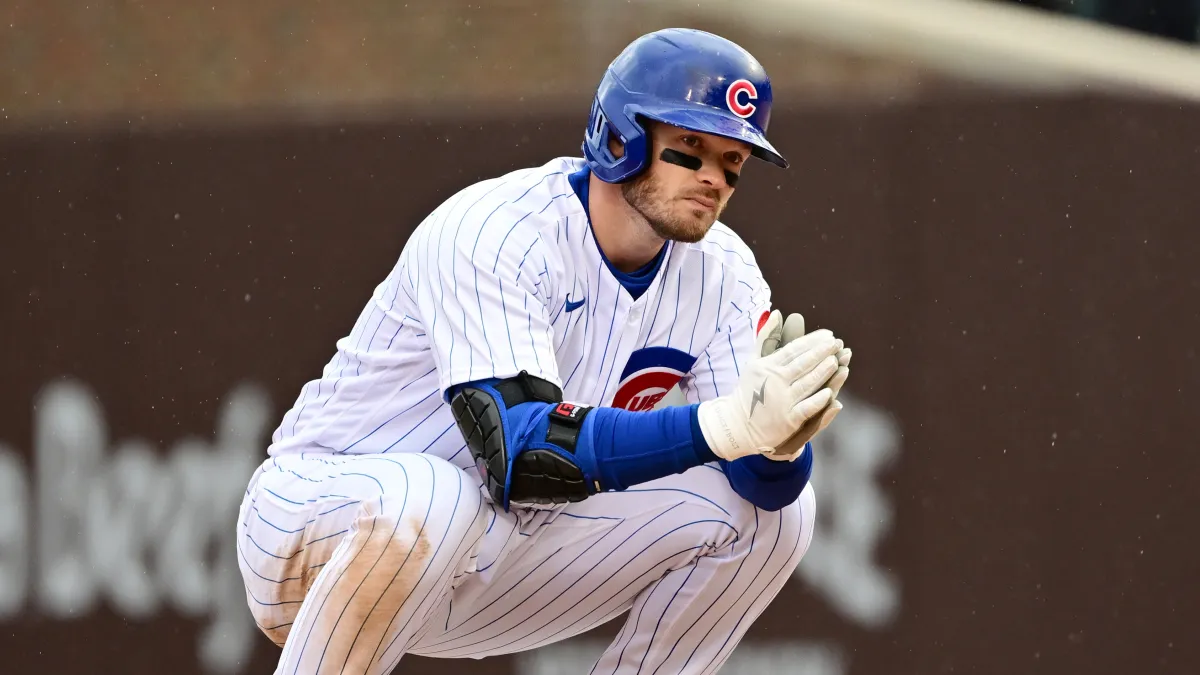CHICAGO — On a quiet Tuesday evening, beneath the glowing lights of Wrigley Field, Chicago Cubs star Ian Happ did something more powerful than launch a home run or make a diving grab in left field—he let fans into the most personal story of his life. In a rare, emotional interview aired live on the Cubs Network, Happ opened up about a loss that has shaped every inning he’s ever played: the death of his father, Keith Happ.
“He passed away just as I was getting drafted into the MLB,” Happ said, voice trembling. “He heard me pitch all my life… but he didn’t get to see me hit a single one in the big leagues.”
The vulnerability in his words stunned even the most seasoned broadcasters. It wasn’t a soundbite—it was a son speaking directly to his father, and to millions watching who’ve carried their own private losses into the public sphere.

A Keepsake Close to His Heart
What Happ revealed next caught the city by surprise. Beneath the layers of his Cubs uniform, next to the protective padding and performance tech, Ian Happ wears something no scout would ever notice—an old radio. It’s the very one his father used to bring to his high school games, tuned in to local broadcasts of his early innings and at-bats.
Since Keith Happ’s passing from brain cancer in 2015, that little radio has gone everywhere with Ian—like a private lifeline to the voice he still hopes to hear.
“I carry him with me every game… in the form of a little radio,” he said quietly, glancing down. “Sometimes I swear I can still hear him. Maybe it’s just in my head—or maybe he’s not gone.”
“He’s Always in the Fourth Row…”
For years, observant fans have noticed something strange: every time Ian Happ rounds the bases after a big hit or glances into the crowd after a key catch, he looks to the same spot in the bleachers—section 134, row four, left side.
Last night, he finally explained why.
“That’s where he used to sit. Always the fourth row, same seat, arms crossed, big smile. No one sits there now. But I still look. I guess it’s a habit—or maybe I just want him to know I’m still playing.”
That ritual, once unnoticed, now carries a weight the city may never forget. Fans are already calling the seat “Keith’s Corner.”
Social Media in Tears
Within moments of the interview airing, #IanHappsRadio was trending in Chicago. Twitter and Instagram were flooded with reactions—not of stats or game highlights, but of memories, empathy, and stories of fathers and sons.
“I lost my dad too. That story hit me harder than any home run,” one fan wrote.
“He’s not just playing baseball. He’s playing for someone. And now we all feel it,” posted another.
Even opposing teams’ fanbases chimed in with tributes, sharing how the story reminded them that baseball, at its core, is still a human game—played by real people with real grief, real love, and real hearts.

More Than an All-Star
Happ is in the middle of what many analysts are calling the best season of his career. His batting average is climbing, his fielding crisp, his leadership tangible. But to fans, he has already secured a different kind of honor.
“He’s not just the heart of the outfield anymore,” said a Cubs reporter. “He’s the heart of Wrigley.”
In an era where headlines are dominated by money, trades, and contracts, Happ’s story has reminded Chicago—and the world—that the most important legacy in sports has nothing to do with numbers.
It’s about who you carry with you when you step onto the field.
A Final Whisper to the Sky
As the interview came to a close, the reporter asked Ian one last question: “If you could say one thing to your dad today, what would it be?”
Ian paused. His eyes glistened. He looked up.
“I’d just tell him… I made it. And I hope I made him proud.”
No bat crack, no cheering crowd, no walk-off win could ever hit harder than those words.
And somewhere in the silence of Wrigley, maybe in that fourth-row seat, a father is smiling back.
